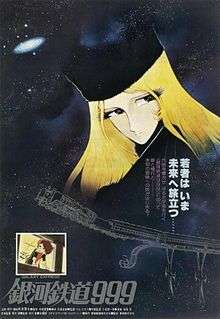Galaxy Express 999 (film)
| Galaxy Express 999 | |
|---|---|
 Japanese film poster for Galaxy Express 999 | |
| Directed by | Rintaro |
| Screenplay by | Shiro Ishimori[1] |
| Based on |
Galaxy Express 999 by Leiji Matsumoto |
| Music by | Nozomu Aoki[1] |
| Cinematography |
|
Production company | |
| Distributed by | Toei |
Release dates |
|
Running time | 129 minutes[2] |
| Country | Japan |
| Language | Japanese |
Galaxy Express 999 (銀河鉄道999 Ginga tetsudō 999) is 1979 Japanese anime film directed by Rintaro.
Cast
- Masako Nozawa as Tetsuro Hoshino
- Masako Ikeda as Maetel
- Asagami Yoko as Claire
- Kenta Kimotsuki as Conductor
- Makio Inoue as Captain Harlock
- Reiko Tajima as Queen Emeraldas
- Takashi Toyama as Tochirō Ōyama
- Noriko Ohara as Crown
- Hidekatsu Shibata as Machinery Earl
- Fujita Huatulco as Shadow
- Ryūji Saikachi as Tavern of the master
- Akiko Tsuboi as Mother of Tetsuo
- Goro Naya as Dr. Pan
English voice cast
- Dicey Adams
- Booker Bradshaw
- Corey Burton - The Conductor
- Jill Fisher
- Fay McKay - Maetel
- Tony Pope - Olaf, Cpt. Warlock
- Gary Seegar
- B.J. Ward - Joey Hanakanabobakananda Smith, Cpt. Emeraldas
Production
The film is a condensed remake of the first year of the most popular episodes of the Galaxy Express 999 television series by Toei Animation.[2]
Release
Galaxy Express 999 was released in Japan on August 4, 1979 where it was distributed by Toei.[2][3] It was the highest grossing film of 1979 in Japan.[4] The film was picked up for distribution in the United States by Roger Corman's New World Pictures in 1980 but was shelved until 1982 after test bookings.[5] The film was the first anime film to receive theatrical distribution in the United States after the establishment of anime fandom in the West.[2] The film premiered in American on August 8, 1981.[6] The American version of the film was edited from the original 129 minute running time to 91 minutes and changed characters names such as Tetsuro Hoshino to Joey "Hana-cana-boba-camanda" Smith.[2]
An English-friendly DVD of Galaxy Express 999 was released on June 28, 2011.[7][8]
Reception
At the third Japanese Academy Awards in 1980, Galaxy Express 999 won the Popularity award for film.[9]
Variety referred to the film as an "attractive Japanese animated sci-fi feature" , but noted that "working in a limited animation format, the chief drawback of which is limited movement [...], the film does boast beautifully-colored, elaborate designs. Once one gets used to the lack of fluid, full animation, the imaginative visuals are impressive" and that "pic deserves a second look"[5]
Aftermath and influence
The film was followed by Adieu Galaxy Express 999 which was released in 1981.[10]
Footnotes
- 1 2 3 "スタッフ&キャスト" (in Japanese). Toei Animation. Retrieved February 1, 2016.
- 1 2 3 4 5 6 Beck 2005, p. 91.
- 1 2 "銀河鉄道999" (in Japanese). Einren.org. Retrieved January 31, 2016.
- ↑ Macias 2003, p. 6.
- 1 2 Willis 1985, p. 407: "Review is of a 91 minute English language-version viewed in New York on July 27, 1982"
- ↑ Beck 2005, p. 90.
- ↑ "The Galaxy Express 999". AllMovie. Retrieved January 31, 2016.
- ↑ "Galaxy Express 999 (DVD)". Anime News Network. Retrieved January 31, 2016.
- ↑ "日本アカデミー賞公式サイト" (in Japanese). Japanese Academy Awards. Retrieved February 1, 2016.
- ↑ Camp 2007, p. 125.
References
- Beck, Jerry (2005). The Animated Movie Guide. Chicago Review Press. ISBN 1569762228.
- Camp, Brian; Davis, Julie (2007). Anime Classics Zettai!: 100 Must-See Japanese Animation Masterpieces. Stone Bridge Press. ISBN 1933330228.
- Macias, Patrick (2003). Anime Poster Art: Japan's Movie House Masterpieces. DH Publishing Inc. ISBN 0972312447.
- Willis, Donald, ed. (1985). Variety's Complete Science Fiction Reviews. Garland Publishing Inc. ISBN 978-0-8240-6263-7.